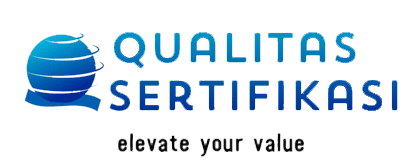Daily Digest
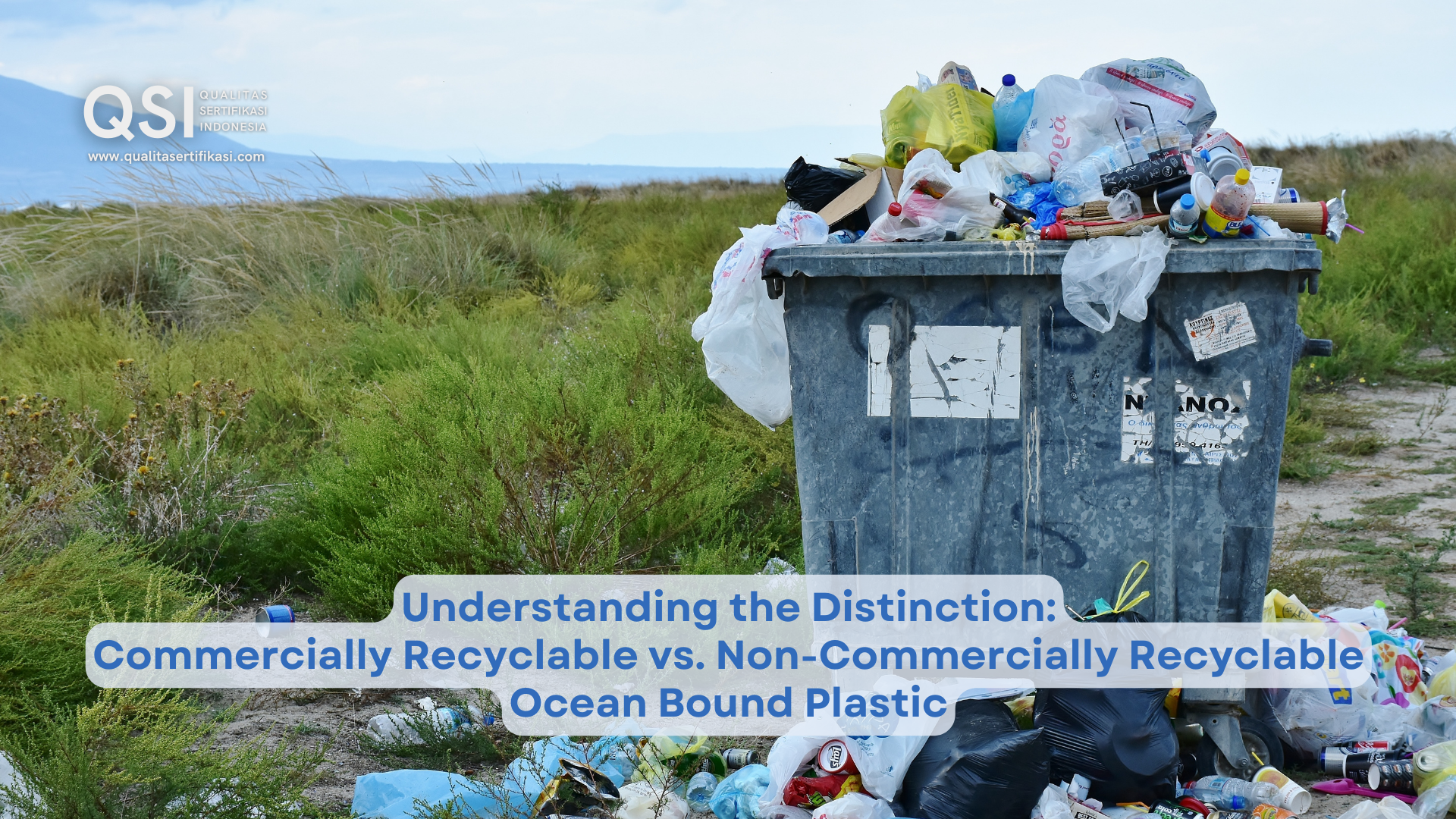
By Muhammad Imam Taufik
•
24 Apr, 2024
Plastic pollution is not just an eyesore – it's a ticking time bomb for our marine ecosystems. Ocean-bound plastic (OBP) poses a particularly severe threat. The key to tackling this lies in understanding two distinct categories of OBP: commercially recyclable and non-commercially recyclable. Knowing this difference will guide our strategies to mitigate the harm caused by OBP before it's too late. Commercially Recyclable OBP: A Path to New Products Commercially recyclable OBP can be sold into existing recycling systems. The key factor is that the price obtained for the recycled material is enough to cover the costs of collecting the OBP in the first place. This economic viability depends heavily on local conditions. The local availability of recycling technology, transportation distances, the density of OBP at a collection site, and the presence of buyers (off-takers) all play a role in whether OBP can be successfully integrated into the recycling value chain. Non-Commercially Recyclable OBP: The Challenge Non-commercially recyclable OBP presents a more difficult problem. This type of OBP cannot be sold to recyclers for several potential reasons: Economics : The sale price may be far less than the cost of collection, making it financially unsustainable. Technical limitations : Current recycling technology may not be suitable for certain types of OBP. Contamination : The OBP may be too heavily degraded or mixed with other materials, making recycling difficult or impossible. Material Composition : Certain plastics are inherently non-recyclable based on their chemical structure. These types of OBP are sometimes referred to as "no value," "negative value," or "low value" materials, as their cleanup and disposal create a cost burden rather than an income source. It's essential to remember that what makes OBP commercially recyclable or not is highly dependent on the local situation. A specific type of plastic might be recyclable in a region with advanced infrastructure and robust recycling markets, yet remain non-commercially recyclable in an area with limited resources and less demand for recycled materials. Addressing the OBP crisis requires a two-pronged approach. For commercially recyclable OBP, expanding collection and recycling infrastructure is crucial. This will turn more waste into a resource, creating value within a circular economy. For non-commercially recyclable OBP, solutions are more complex. We need investment in new recycling technologies, research into alternative disposal methods, and policies focused on preventing this type of plastic from entering the environment in the first place. Understanding the difference between commercially and non-commercially recyclable OBP is a critical step in tackling ocean plastic pollution. It helps guide our efforts toward the most effective solutions in combating this persistent environmental problem. Learn about the OBP Certification Program and how it can benefit your business – visit our website or get in touch with us!

By Muhammad Imam Taufik
•
18 Apr, 2024
Kartini Day, celebrated annually on April 21st in Indonesia, honors Raden Adjeng Kartini, a pioneer of women's rights and education in the early 20th century. Her unwavering belief in the potential of women to shape society continues to inspire progress towards gender equality. As we reflect on Kartini's legacy, it's vital to recognize the ways women are leading the way in modern advancements – including the field of sustainability certification. Breaking Down Barriers Auditor role in sustainability certification is a critical position that examines an organization's impact on economic, social, and environmental factors – the three pillars of sustainability. Auditors assess how businesses manage resources, their effect on environment and communities, ethical supply chain practices, and adherence to sustainable standards. However, women remain underrepresented. QSI actively works to dismantle this barrier by providing women with the same opportunities and resources as their male counterparts. Leading the Charge in Gender Equality At QSI, we recognize that the path to a sustainable future is paved through equality. We firmly believe that women and men should have the same opportunities to shape a responsible and ethical world, which is why we are actively fostering a workplace where female sustainability auditors thrive. We actively promote a culture that empowers women auditors in several ways: Fair Hiring Practices QSI actively works to dismantle this barrier by implementing blind recruiting practices. This means resumes are reviewed without identifying information like gender, ensuring the selection process focuses solely on qualifications and experience. This approach allows talented women to be judged on their merits, increasing their chances of securing exciting opportunities as an Auditor. Equal Opportunity We ensure women have equal access to challenging assignments and leadership positions. Performance and qualifications are the sole criteria for advancement. Fostering Collaboration We cultivate an inclusive environment where women feel comfortable voicing their ideas and contributing to critical decision-making processes. Flexible Arrangements Support women in balancing work and family responsibilities by offering flexible work options and family-friendly policies. Benefits of a Gender-Balanced Workforce A workforce that reflects the diversity of the world brings a multitude of benefits. Here's how a gender-balanced team of Auditors strengthens QSI: Enhanced Decision-Making Diverse perspectives lead to richer discussions and a more comprehensive understanding of complex issues. Improved Client Service A diverse team of auditors can better relate to a wider range of clients, fostering stronger partnerships and a deeper understanding of their unique challenges and needs. Innovation and Creativity When diverse minds collaborate, innovation thrives. A gender-balanced team can spark new ideas and approaches, leading to a more dynamic and effective organization. Empowering women auditors is not just a matter of fairness; it's a strategic imperative for driving positive change in the sustainability landscape. By harnessing the talents and perspectives of women, we can strengthen the integrity and effectiveness of sustainability certification processes, ultimately contributing to a more resilient and equitable world for generations to come. Let us continue to champion equality, diversity, and inclusion, not just on Kartini's Day, but every day, as we work towards a brighter and more sustainable future for all!
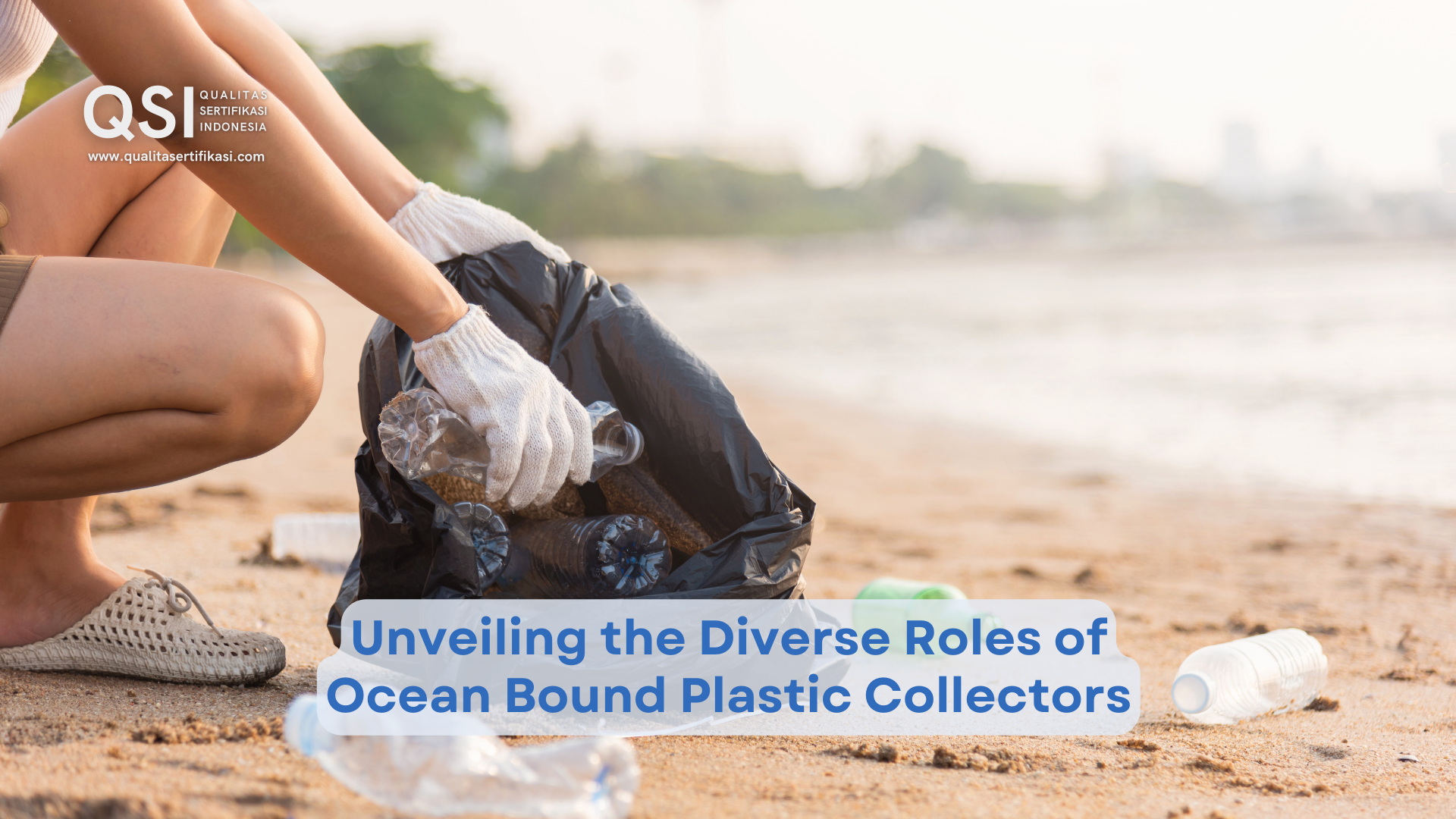
By Muhammad Imam Taufik
•
15 Apr, 2024
The image of a majestic whale entangled in plastic debris, or a sea turtle mistaking a plastic bag for a jellyfish, is a stark reminder of the growing crisis of ocean plastic pollution. Millions of tons of plastic waste enter our oceans each year, causing devastating consequences for marine ecosystems and ultimately, for ourselves. The fight against this plastic tide requires a multi-pronged approach, and at the very forefront stands a diverse group of individuals and organizations: the Ocean Bound Plastic (OBP) collectors. These dedicated entities play a critical role in intercepting plastic waste before it reaches our precious oceans, but their roles and responsibilities are as varied as the landscapes they operate in. By understanding this intricate network of collectors, we gain a deeper appreciation for the complex yet crucial efforts underway to protect our oceans. Collection Organization Lead the charge in OBP collection, responsible for organizing the systematic retrieval of OBP. These entities, whether companies or other organizations, stick to strict standards outlined in the OBP Collection Organization Standard (OBP-COL-STD). Small Collector While Collection Organizations handle large-scale collection, there's another important group: Small Collectors. These legal entities collect OBP and sell it to certified organizations under the OBP Collection Organization Standard (OBP-COL-STD) or the OBP Neutralization Services Provider Standard (OBP-NEU-STD). Independent Collector On a smaller scale are Independent Collectors, typically individuals or very small groups operating independently. Despite their modest size, Independent Collectors play a crucial role by collecting and selling smaller quantities of OBP, typically below 200 kilograms per day on a monthly average. Supplier Group These are a collaborative effort specifically designed for Small Collectors, which linked contractually to a certified organization, allow smaller entities to pool their resources and expertise. This collaborative approach makes OBP collection more accessible and efficient for smaller organizations, while ensuring adherence to OBP standards. Central to the effectiveness of these collection mechanisms are the standards set forth by the OBP Certification Program. By adhering to guidelines outlined in documents such as the OBP Collection Organization Standard (OBP-COL-STD), collectors ensure that their activities are not only effective but also environmentally responsible. These standards provide a framework for accountability, transparency, and continuous improvement within its ecosystem. If you're interested in learning more about how your organization can get involved in the OBP Certification Program, please visit our website or give us a call . See you, Qualizer !
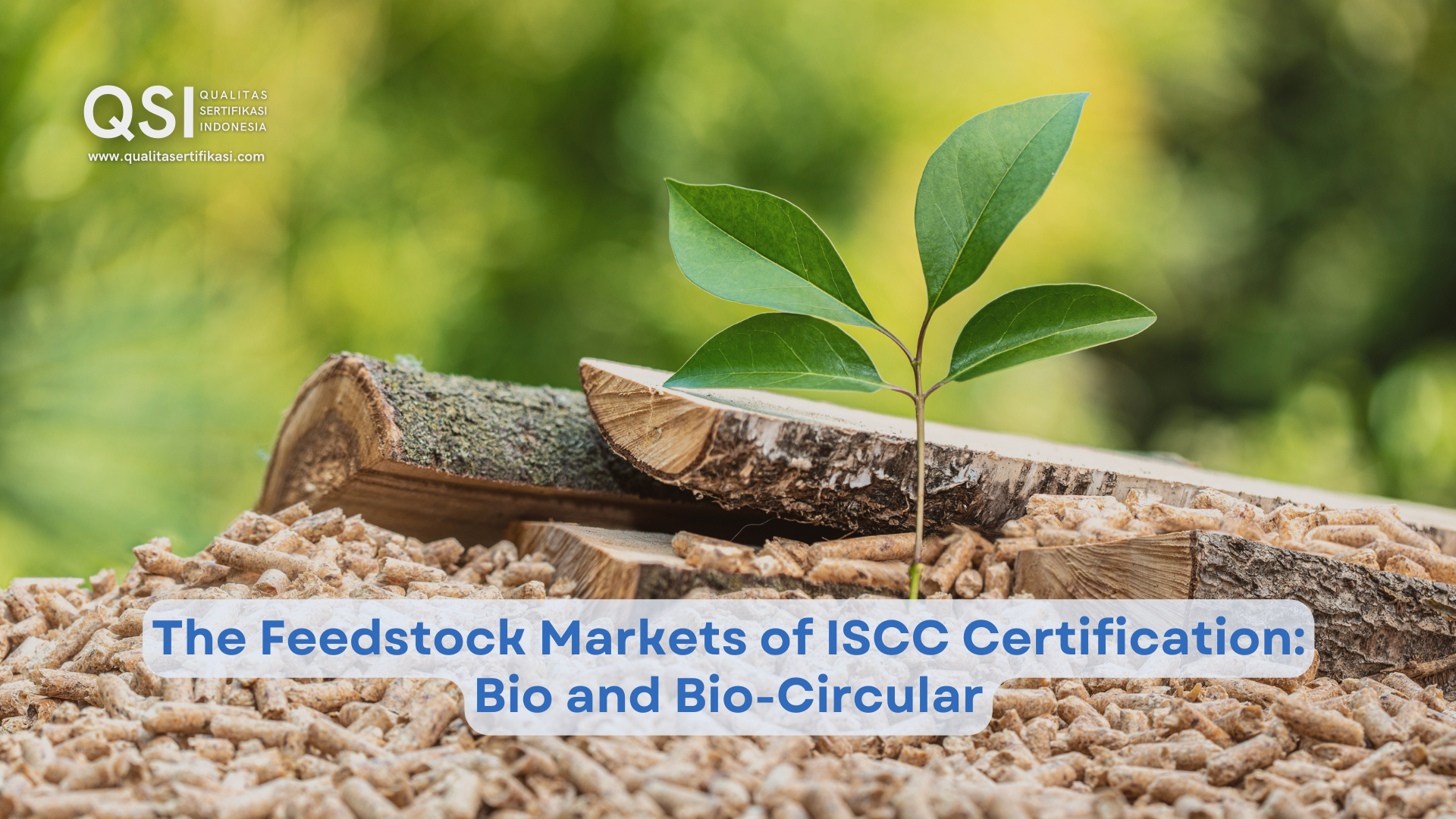
By Muhammad Imam Taufik
•
10 Apr, 2024
The International Sustainability and Carbon Certification (ISCC) is a leading force in ensuring the environmentally, socially, and economically responsible production of the feedstock markets. This commitment translates into a set of stringent certification requirements that promote sustainability throughout the entire supply chain. At its core, ISCC aims to foster the sustainable production of biomass and its derived products. A fundamental aspect of this commitment is the prohibition of converting lands with high biodiversity value or carbon stock for biomass production. This prohibition not only safeguards ecosystems but also promotes responsible land management practices. Moreover, ISCC mandates minimum greenhouse gas (GHG) savings, surpassing mere compliance with European legislation. By setting higher benchmarks, ISCC encourages continual improvement and awareness in emission reduction efforts. Diving deeper into ISCC's framework, there are two primary categories of feedstocks: Bio and Bio-Circular materials. Bio At the heart of ISCC’s mission is the preservation of biodiversity and carbon-rich ecosystems. The certification strictly prohibits converting land of high ecological value into biomass production areas, thereby ensuring that the feedstocks market does not contribute to deforestation. This approach not only aligns with European legislation but also fosters global awareness and encourages ongoing efforts to reduce emissions. The Bio feedstock encompasses virgin biomass, the biodegradable portion of products from agriculture, forestry, fisheries, and aquaculture. ISCC's sustainability principles for farms and plantations, encompassing legal requirements and additional environmental, social, and economic considerations, guide responsible production practices. ISCC’s sustainability framework for farms and plantations is encapsulated in six principles. The first principle aligns with the Renewable Energy Directive II (RED II), setting the legal groundwork. The subsequent principles elevate the standard by addressing broader environmental, social, and economic aspects. Adherence to these principles is not just compliance; it’s a commitment to a world free from deforestation, enriched biodiversity, and robust ecosystems. Bio-Circular The Bio-Circular feedstock focuses on waste and residues from agriculture, forestry, and even household waste. Bio-circular is a prime example of the Circular Economy in action. Instead of being landfilled or burned, these waste materials are diverted and given a new life. This reduces reliance on finite resources, lowers greenhouse gas emissions, and lessens the pressure on agricultural land. The significance of utilizing waste and residues cannot be overstated. Apart from reducing environmental footprint and reliance on finite resources, these materials alleviate pressure on agricultural land, preventing competition with food or feed crops. Encouragingly, many European Union Member States incentivize the use of biofuels derived from wastes and residues under the Renewable Energy Directive (RED II), aligning with ISCC's mission. Central to ISCC's certification process is the rigorous management of waste and residues throughout the supply chain. Origin points, such as restaurants generating used cooking oil, must ensure that waste is unavoidable and not deliberately created. Additionally, farms and plantations producing agricultural residues must adhere to ISCC sustainability principles, implementing waste management plans and adopting best practices to minimize landfilling and on-site burning. By promoting sustainable feedstock production and responsible waste management practices, ISCC certification paves the way for a greener future. Its commitment to reducing deforestation, minimizing GHG emissions, and fostering a circular economy positions ISCC as a leader in the drive towards a more sustainable and environmentally conscious world. Stay tuned as we are going to discuss the other categories of feedstock markets: circular and renewable! In the meantime, please visit our website or give us a call if you want to know more about the bio and bio-circular of the ISCC certification!
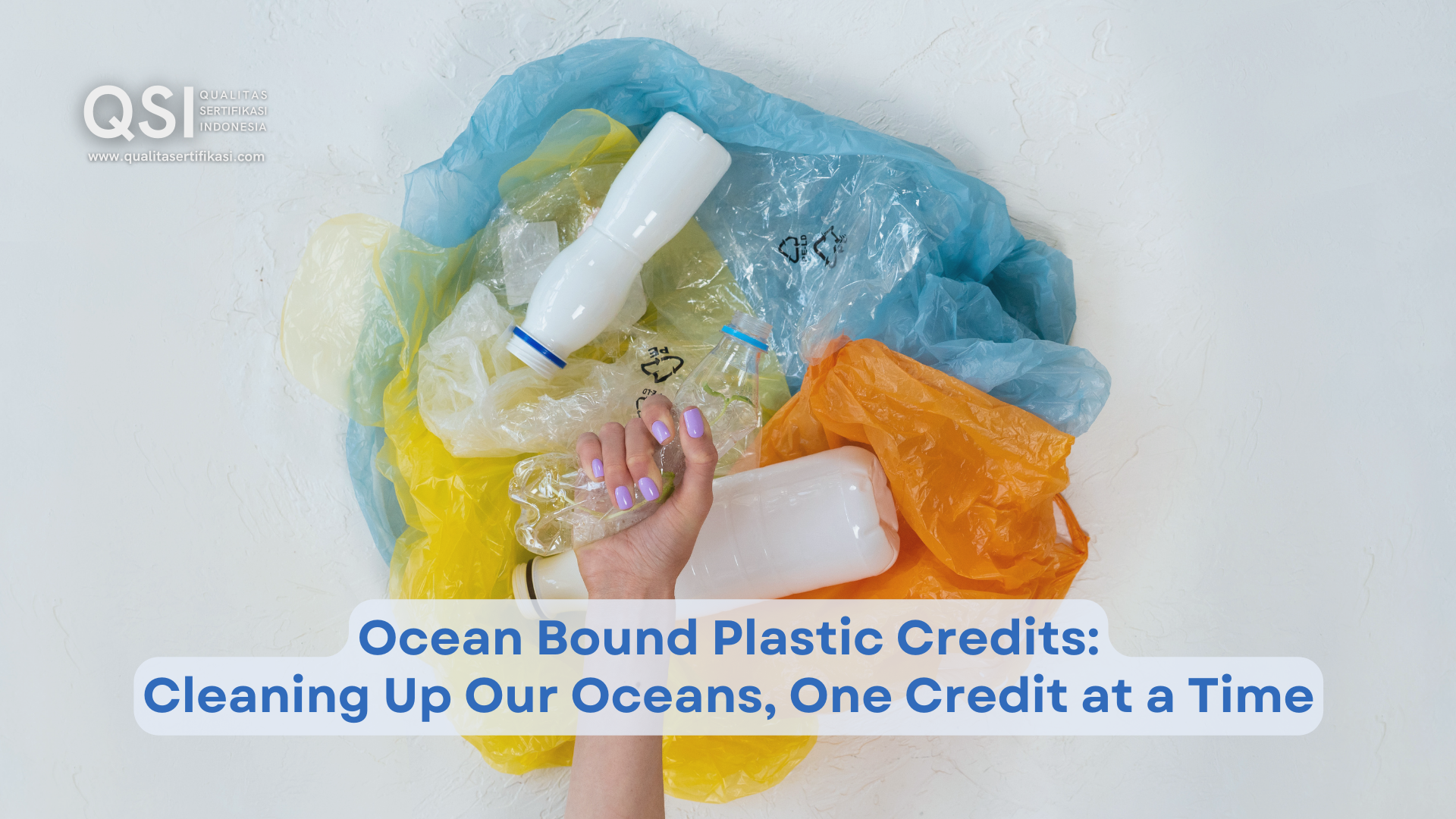
By Muhammad Imam Taufik
•
08 Apr, 2024
In the ongoing battle against plastic pollution, innovative solutions are emerging to tackle the pressing issue of ocean-bound plastic waste. One such solution gaining momentum is the concept of Ocean Bound Plastic (OBP) Credits. These credits represent a significant step forward in the fight to remove low-value plastic from the environment while incentivizing sustainable practices. Let's delve into what OBP Credits entail and their potential impact. Understanding OBP Credits Imagine a currency dedicated to cleaning our oceans. Each OBP Credit represents one kilogram of low-value OBP collected and responsibly treated by a certified organization. These credits are independently verified to ensure the plastic is genuinely removed from the environment, not simply estimated or forecasted. In the OBP certification program, this type of plastic waste is called Non-Commercially Recyclable OBP. It refers to any plastic waste that can't be recycled at a profit and therefore never gets collected for recycling. How Does it Work? The process involves several key steps: Certified Project The journey of an OBP Credit begins with organizations dedicated to collecting and treating OBP waste undergo a rigorous certification process. They must meet the OBP-NEU-STD standard, ensuring responsible collection, ethical treatment, and transparent tracking. Verification and Issuance Third-party certification bodies verify the project's work, guaranteeing the plastic's removal and treatment. Tracking and Transparency Once verified, the corresponding OBP Credits are issued and tracked in the Zero Plastic Oceans (ZPO) registry, providing transparency and accountability. How Can Businesses Use OBP Credits? Companies can utilize OBP Credits as part of their plastic footprint reduction strategies. Here's the typical approach: Plastic Footprint Assessment Businesses first identify their plastic usage. Reduction Strategies Companies implement measures to minimize unnecessary plastic use and optimize internal operations for circularity (reusing and recycling plastic). Offsetting Remaining Plastic Footprint After implementing reduction strategies, companies can offset any unavoidable plastic use by purchasing OBP Credits. The Benefits of OBP Credits By purchasing OBP Credits, companies gain several advantages: Direct Impact Funding goes towards projects that remove plastic waste unlikely to be collected otherwise. This ensures the project's viability and a tangible environmental benefit. Empowering Waste Pickers Certified projects often operate in developing countries, creating jobs and improving working conditions for waste pickers. They can collect and sell a wider variety of plastic waste, increasing their income. OBP Credit Issuance and Retirement OBP Credits are issued by certified organizations that meet the "OBP Neutralization Services Provider Standard." Following verification of their work, the certification body issues batches of OBP Credits. Each credit is serialized and registered with ZPO, guaranteeing its authenticity. Once a company acquires OBP Credits to offset their plastic footprint, those credits are retired. The unique identifier system ensures each credit can only be used once, preventing double-counting. OBP Credits offer a powerful tool in the fight against ocean plastic pollution. By removing waste, supporting ethical waste collection practices, and promoting responsible business practices, OBP Credits contribute to a cleaner and healthier planet. Ready to join the movement and make a real difference? Visit our website at or give us a call to learn more about how OBP Credits can help your business achieve its sustainability goals!

By Muhammad Imam Taufik
•
04 Apr, 2024
Welcome back again, Qualizer ! In our previous two dives, we explored the exciting world of ISCC certification and its impact on established markets like circular & bio economy and sustainable road transport fuels . We saw how ISCC helps ensure responsible practices throughout supply chains. But the reach of ISCC extends far beyond these established sectors. But fasten your seatbelts, because this journey takes flight! Part three of our series sets our sights on the high skies, exploring the exciting intersection of ISCC and the burgeoning market for sustainable aviation fuels (SAF). We'll delve into the world of feedstocks – the raw materials that fuel this clean energy revolution – and explore how ISCC plays a crucial role in ensuring their sustainability. Sustainable Aviation Fuels Sustainable aviation fuels (SAF) are a game-changer for the aviation industry. Unlike traditional jet fuel, SAF is derived from sustainable sources like used cooking oil, waste fats, or non-food crops. This green alternative significantly reduces greenhouse gas emissions throughout its lifecycle, with some studies suggesting an impressive 80% drop compared to fossil fuels . Importantly, SAF blends seamlessly with conventional jet fuel and requires no modifications to existing airplanes, making it a practical and impactful solution for airlines. The environmental benefits of SAF are coupled with advantages like increased energy security and a more geographically diverse fuel supply. ISCC certification ensures the sustainability of these innovative fuels across their entire production chain. ISCC covers various types of SAF, including: Biofuels : Liquid fuels derived from sustainable biomass; Renewable Fuels of Non-Biological Origin (RFNBO) : The process energy that provides the energy input for the final fuel (e.g. electricity generated from wind, solar, aerothermal, geothermal or water). This process energy has to be derived from renewable sources other than biomass; Recycled Carbon Fuels : Produced from liquid and solid waste streams of non-renewable origin or waste processing and exhaust gas of non-renewable origin. ISCC certification ensures the sustainability of SAF across its entire supply chain, from the source of the feedstock to the final fuel delivery. The system offers three relevant certification schemes to cater to different needs: ISCC CORSIA : This scheme is specifically designed to meet the sustainability criteria established by the International Civil Aviation Organization (ICAO) for the Carbon Offsetting and Reduction Scheme for International Aviation (CORSIA). Airlines utilizing SAF under CORSIA can leverage ISCC certification to demonstrate compliance; ISCC EU : This scheme caters to the requirements of the European Union's Renewable Energy Directive II (RED II) for biofuels placed on the EU market; ISCC PLUS : This versatile scheme offers broader applicability beyond specific regulations. It can be used for voluntary sustainability claims in non-regulated markets or for SAF outside the EU. Feedstocks The ISCC certification goes beyond just promoting sustainable aviation fuels (SAF). ISCC also plays a vital role in ensuring the sustainability of the entire supply chain, with a strong focus on the source material: feedstocks . ISCC certification covers a wide range of sustainable feedstocks, categorized into four distinct groups: Bio : This category encompasses virgin biomass, the biodegradable portion of products cultivated through agriculture, forestry, and related industries like fisheries and aquaculture. Examples include energy crops specifically grown for fuel production; Bio-Circular : This group focuses on waste and residues of biological origin. It includes used cooking oil, waste fats, and manure from agriculture, forestry, and related industries, along with the biodegradable fraction of industrial and municipal waste. Bio-Circular feedstocks offer a sustainable alternative by diverting waste from landfills and putting it to good use; Circular : Derived from the mechanical or chemical processing of recyclable materials, but not those of biological origin (fossil-based). While not typically used in SAF production, this category is crucial for other ISCC certified products like sustainable plastics or textiles; Renewable : This group encompasses materials harvested from processes powered by renewable energy sources like wind, solar, or geothermal. The diverse range of markets covered by ISCC certification is key to achieving a more sustainable future across various industries. It provides a pathway for businesses to reduce their reliance on fossil fuels and transition towards a circular economy where waste becomes a valuable resource. Interested in learning more about ISCC and how it can benefit your business? Visit our website for detailed information or contact us for personalized assistance from our team. See you again, Qualizer !
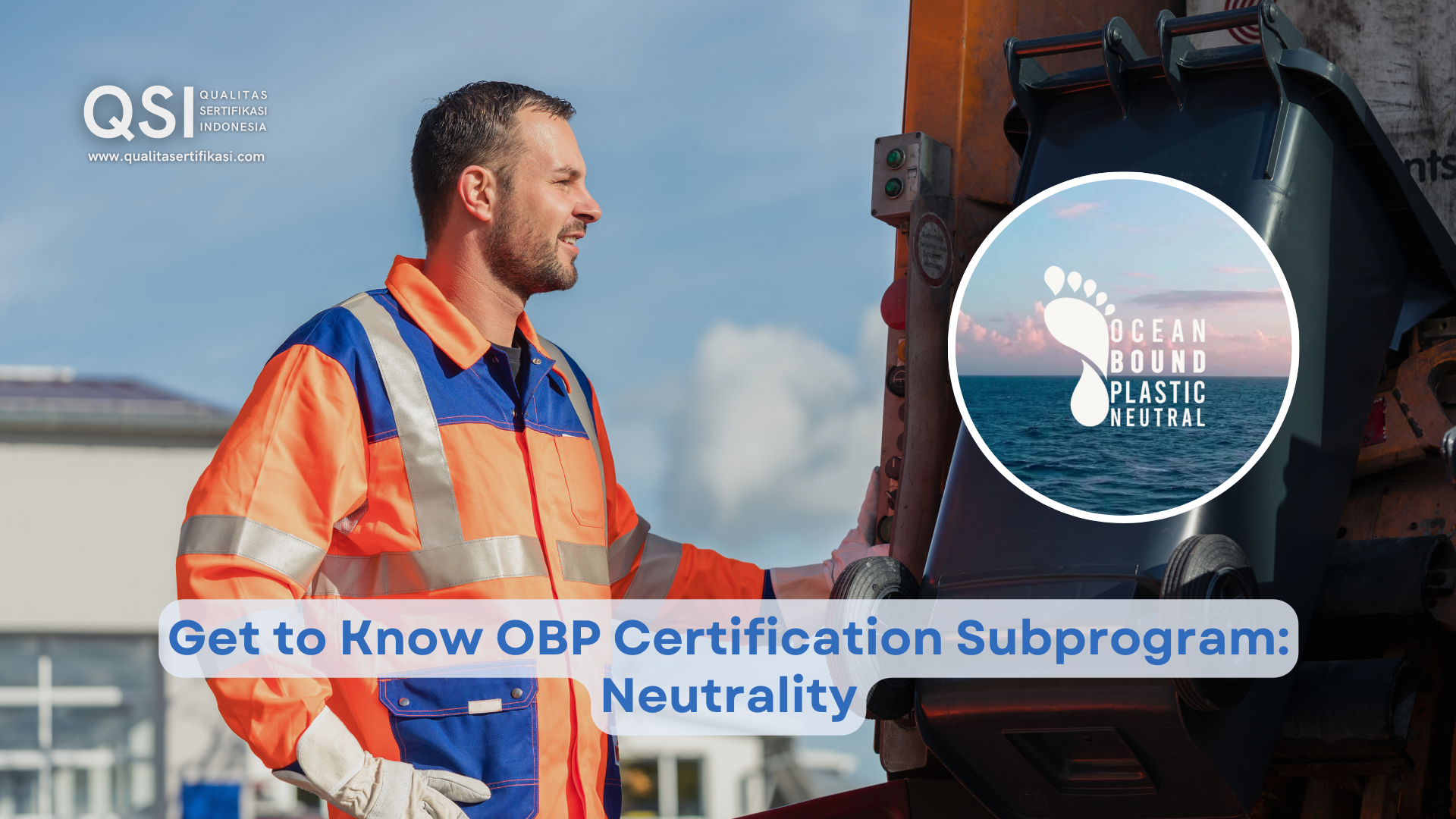
By Muhammad Imam Taufik
•
03 Apr, 2024
Hi there, Qualizer ! It's good to have you back. In our previous article , we explored the OBP Recycling Subprogram , a key initiative tackling commercially recyclable ocean bound plastic. While this program is making strides, a significant portion of OBP remains non-commercially recyclable. This non-recyclable plastic poses a major threat to our oceans, often left uncollected due to its lack of market value. This time, we're turning our attention to another crucial aspect: the OBP Neutrality Subprogram, offering a market-based solution to address this challenge. You ready? Let's jump right in! Ocean Bound Plastic (OBP) Certification Program The OBP Certification Program is designed to protect our oceans by encouraging the removal of OBP from the environment. It achieves this by adding value to the effective collection, treatment, and recycling of OBP before it reaches the ocean. OBP Neutrality Certification Subprogram This program tackles ocean bound plastic waste that isn't readily recyclable with current technology. It targets organizations that collect and manage this type of waste, as well as companies that want to reduce their plastic footprint. Here's how it works: Certified organizations can issue and sell "OBP credits," which represent the amount of neutralized plastic waste they've managed. Companies can then buy these credits to demonstrate their commitment to reducing their plastic impact on the environment. Key aspects of the OBP Neutrality Certification Subprogram include: Addresses non-commercially recyclable OBP, which doesn't have a readily available recycling market. Targets organizations that collect and treat this type of plastic waste or companies seeking to offset their plastic footprint. Enables certified organizations to issue and sell verified "OBP credits" representing the neutralized plastic waste. Allows companies to purchase these credits to demonstrate their commitment to plastic neutrality. Utilizes two certification standards: OBP Neutralization Service Provider Standard (OBP-NEU-STD) : Covers collection, waste management, and verification of OBP credits. OBP Plastic Producers and Users Standard (OBP-PRO-STD) : Allows companies to offset their plastic footprint by purchasing verified OBP credits. The OBP Neutrality Subprogram offers a glimmer of hope in the fight against ocean plastic pollution. By creating a market for what was once considered waste, it empowers collectors and incentivizes responsible waste management. This innovative program is a testament to human ingenuity in tackling environmental challenges. If you're interested in learning more about how your organization can get involved in the OBP Certification Program, or how your company can offset its plastic footprint through verified OBP credits, visit our website or give us a call . Together, we can make a difference for our oceans!
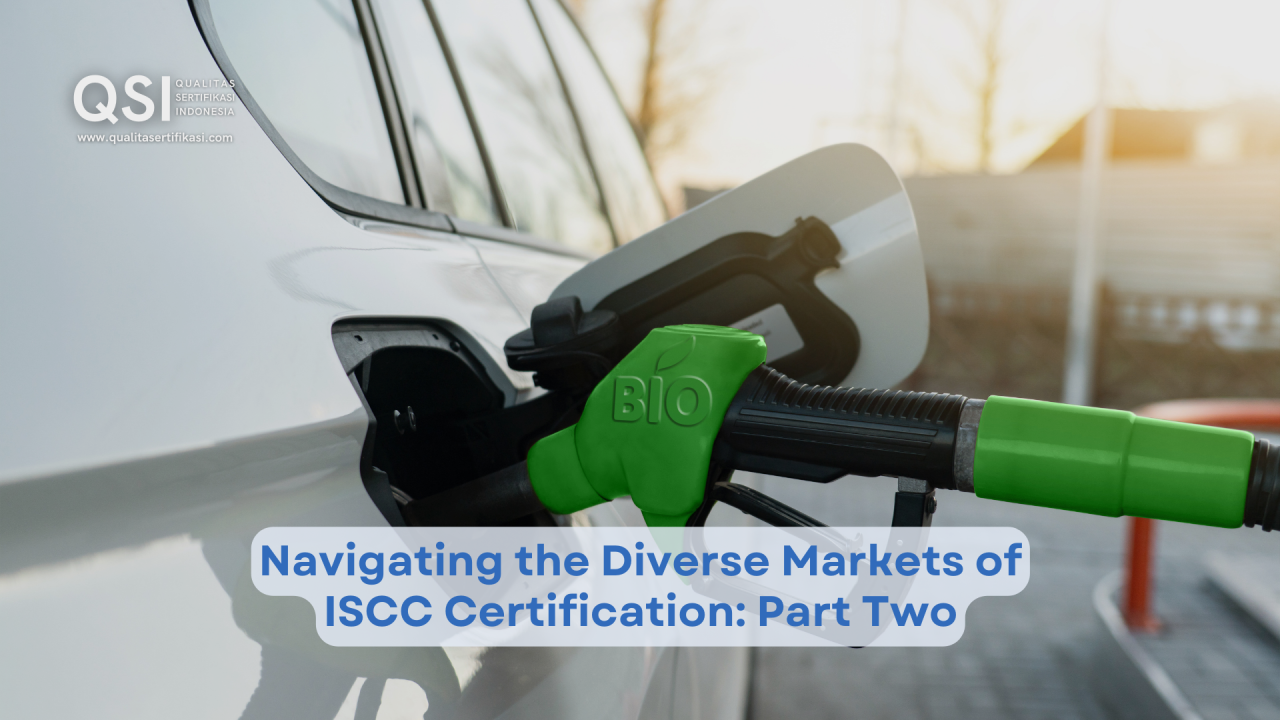
By Muhammad Imam Taufik
•
22 Mar, 2024
Hi, Qualizer ! In our previous article , we explored the diverse market categories covered by the International Sustainability and Carbon Certification (ISCC), emphasizing its role in promoting responsible practices across various industries, from Circular & Bio Economy to Feedstocks. Continuing our journey through ISCC's certification landscape, let's delve into other crucial sectors: Sustainable Road Transport Fuels and Sustainable Marine Fuels, and Food & Feed. Sustainable Road Transport Fuels Sustainable Road Transport Fuels refer to fuels used in road vehicles that meet specific sustainability criteria. These criteria ensure that the production and use of these fuels have minimal environmental impact and contribute to reducing greenhouse gas emissions. In the legal context, the European Commission (EC) has set sustainability requirements for the production of road transport fuels. These requirements are outlined in the Renewable Energy Directive (RED) and the Fuel Quality Directive (FQD). The focus is on both bio-based feedstocks and waste and residues as sources for sustainable fuels. The covered fuels include: Biofuels : These are liquid fuels produced from bio-based feedstocks (such as vegetable oils, animal fats, or algae). Biogas/Biomethane : Gaseous fuels produced from organic materials (e.g., agricultural residues, sewage, or organic waste). Renewable Fuels of Non-Biological Origin (RFNBO) : These include fuels like hydrogen and its derivatives, which can be produced sustainably. Recycled Carbon Fuels : Fuels derived from recycled carbon sources (e.g., carbon capture and utilization). The ISCC certification provides certification for sustainable fuels through schemes like ISCC EU and ISCC PLUS. Companies such as Primagaz France (which produces ISCC-certified biopropane) and Argent Energy (which converts fatbergs into biodiesel) exemplify the use of sustainable fuels. Sustainable Marine Fuels Shipping goods globally is essential, and maritime transport remains the least carbon-intensive way to move goods compared to road and aviation. However, the shipping industry still contributes significantly to greenhouse gas emissions. As global demand for raw materials and finished products continues to rise, the maritime sector must undergo transformation to align with the European Union’s ambitious goal of becoming a climate-neutral economy by 2050. Types of Sustainable Marine Fuels Covered Under ISCC Certification: Biofuels : These liquid fuels are produced from bio-based feedstocks specifically for the transport sector. They offer a renewable alternative to conventional fossil fuels. Renewable Fuels of Non-Biological Origin (RFNBO) : These sustainable fuels are not derived from biological sources. They include options like synthetic fuels produced through renewable energy-powered processes. Recycled Carbon Fuels : These fuels are produced from recycled carbon sources, such as waste materials or captured carbon dioxide. The maritime sector currently relies heavily on fossil fuels, especially heavy fuel oil. While Liquefied Natural Gas (LNG) serves as an alternative fuel available today, its carbon intensity limits its widespread use in the bunker fuel mix for 2050. Furthermore, the European Commission’s “Fit for 55” package aims to reduce net greenhouse gas emissions by at least 55% by 2030. As part of this effort, the proposed “FuelEU Maritime” regulation, expected to come into force by 2025, incentivizes the adoption of low-carbon maritime fuels. Food & Feed In the food and feed industry, the ISCC certification is increasingly being used for sustainability certification. The ISCC PLUS is used for an increasing number of products in the food industry, which means that the ISCC on-product logo and corresponding consumer claims are appearing on more and more products in grocery stores. The ISCC PLUS provides assurance that the mills, bakeries, and farmers adhere to sustainability, traceability, and no-deforestation requirements. In addition to the core requirements, interested parties can choose from a set of voluntary add-ons, such as reducing GHG emissions, producing non-GMO, or reducing the usage of water, fuel, and electricity. In addition to the core requirements, interested parties can choose from a set of voluntary add-ons, such as reducing GHG emissions, producing non-GMO, or reducing the usage of water, fuel, and electricity. There are several examples of ISCC certified products, including soft wheat by Barilla, corn-based sweeteners by Hungrana, rum by Botran, sugar cane by Pantaleon, and shea by AAK. The ISCC also offers a standard for the sole certification of non-genetically modified materials and products. As we conclude our exploration into the diverse market categories covered by the ISCC, it becomes increasingly evident that ISCC stands at the forefront of promoting responsible practices across various industries. In this continuation of our journey through ISCC's certification landscape, we delved into Sustainable Road Transport Fuels, Sustainable Marine Fuels, and Food & Feed, unveiling the pivotal role of certification in driving sustainability and mitigating environmental impact. Interested in learning more about ISCC and how it can benefit your business? Visit our website for detailed information or contact us for personalized assistance from our team. See you again, Qualizer !
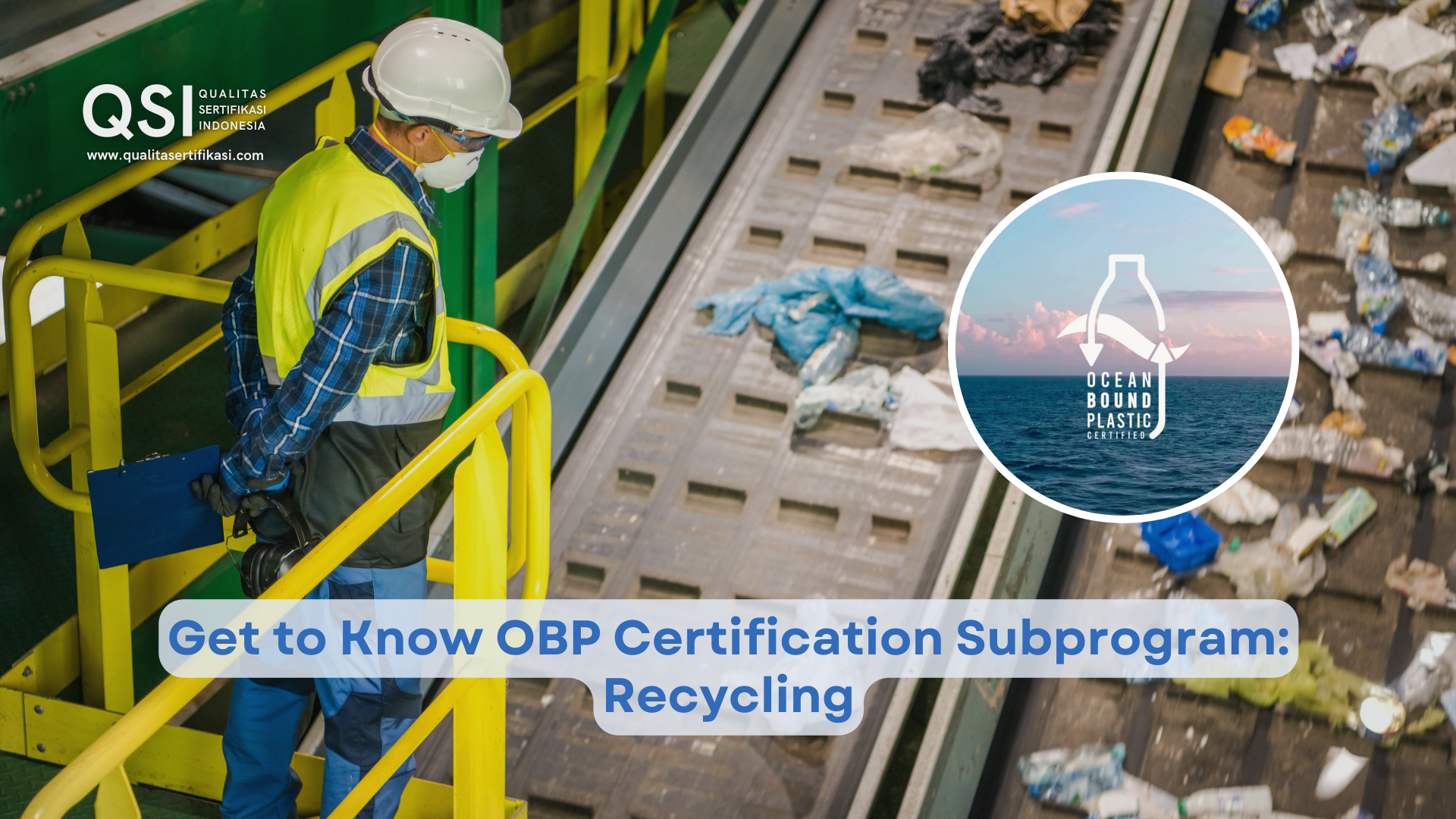
By Muhammad Imam Taufik
•
21 Mar, 2024
In the urgent quest for environmental sustainability, addressing plastic pollution in our oceans has emerged as a critical challenge. As awareness grows about the detrimental impacts of plastic waste on marine ecosystems, innovative solutions are essential. Among these solutions, certification programs play a pivotal role in incentivizing and validating sustainable practices. One such pioneering initiative is the Ocean Bound Plastic (OBP) Certification Program, comprising the OBP Recycling Certification Subprogram and the OBP Neutrality Certification Subprogram . Ocean Bound Plastic (OBP) Certification Program The OBP Certification Program is designed to protect our oceans by encouraging the removal of OBP from the environment. It achieves this by adding value to the effective collection, treatment, and recycling of OBP before it reaches the ocean. The program consists of two key subprograms, one of them is OBP Recycling Certification Subprogram. OBP Recycling Certification Subprogram This program targets ocean bound plastic waste that can be recycled using existing recycling methods. It ensures responsible collection by following ethical practices towards waste pickers and adhering to social and environmental standards. The program tracks the plastic throughout the process, from collection points to its transformation into new products. Key features of the OBP Recycling Certification Subprogram include: Focuses on commercially recyclable OBP. Targets organizations involved in collecting and recycling this plastic waste responsibly. Ensures ethical collection practices that treat waste pickers fairly and adhere to social and environmental standards. Guarantees the traceability of OBP throughout the recycling process, from collection points to its transformation into new products. Achieves this through two certification standards: OBP Collection Organization Standard (OBP-COL-STD) : Covers the ethical collection of OBP. OBP Recycling Organization Standard (OBP-REC-STD) : Ensures proper recycling, fabrication, and sale of recycled OBP products. OBP certification offers businesses a strategic edge. By obtaining OBP certification, businesses demonstrate their commitment to sustainability, which enhances brand reputation, fosters consumer trust, and opens doors to new markets and partnerships. Furthermore, by participating in the OBP certification, you gain access to a verified supply chain for recycled ocean plastic, potentially reducing reliance on virgin plastic and associated costs. As pioneers in this transformative movement, businesses stand to gain not only a competitive edge but also a stake in shaping a future where profitability and planet protection go hand in hand. Ready to differentiate your business as a leader in sustainability? Explore the OBP Certification Program on our website or reach out to us for more information. Our team is dedicated to assisting you in incorporating this certification into your business strategy to gain a competitive edge in the industry!
General Inquiries
Phone
+62 21 2949 1946
Headquarter
The CEO Building Level 12th,
Jl. TB Simatupang No. 18C,
Cilandak Barat, Cilandak,
Jakarta Selatan, DKI Jakarta, 12430
Indonesia
Programs
Quick Links
© 2024
Qualitas Sertifikasi Indonesia
© 2024
PT Qualitas Sertifikasi Indonesia
